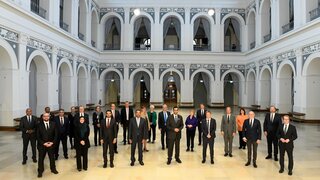First hydrogen shipment from UAE received by H.E. Sultan Al Jaber & Minister Robert Habeck in Hamburg

The first hydrogen delivery for Germany from the United Arab Emirates (UAE) was welcomed at the port of Hamburg today by Federal Minister for Economic Affairs and Climate Action Robert Habeck. Agreement on the delivery was reached during a visit to Abu Dhabi by a delegation led by Minister Habeck on 21 March. It is an important step for the planned expansion of a comprehensive hydrogen value chain between Germany and the UAE.
Federal Minister for Economic Affairs and Climate Action Robert Habeck said: "We now need to speed up the roll-out of the hydrogen economy more than ever. For this purpose, we are also establishing hydrogen production in Germany, but of course we rely in particular on imports of hydrogen. We therefore want to extend energy cooperation to this area.
"When I was in the United Arab Emirates seven months ago, it was agreed to establish an integrated hydrogen supply chain between the UAE and Germany. I am very pleased about the progress we have since made. Today we are receiving the first test shipment of low-carbon ammonia from the UAE in Hamburg. More will follow soon."
Dr. Peter Tschentscher, First Mayor of the Free and Hanseatic City of Hamburg, said: "Hamburg aims to become a leading hydrogen hub in Europe. Aurubis and other companies located in Hamburg are already using innovative hydrogen technologies. Our port offers excellent conditions for importing and distributing renewable energy sources. As a globally networked trade and logistics city, Hamburg can contribute its expertise to the Energy and Climate Partnership between Germany and the United Arab Emirates. Firms in Hamburg are part of the current ammonia project in the fields of transport and application. I want to cordially thank everyone who has made this pilot project possible."
The hydrogen delivered by the Emirati company ADNOC was shipped in the form of blue ammonia, which is considered low-emission and, unlike green ammonia, is available in larger quantities. Tests of the deliveries are key to developing supply chains for green hydrogen in future. The Hamburg-based metal producer Aurubis is already using the first low-emission ammonia deliveries to make its energy-intense copper production climate-neutral. The aim is to substitute fossil fuels, including natural gas, in the long term. The second delivery is due to arrive in Hamburg early in November. More will follow for use by further customers.
Germany and the UAE have agreed to promote joint energy and industry projects by means of targeted political support. An Energy Security and Industry Accelerator (ESIA), which has already been agreed on, is to provide targeted funding for flagship projects in the fields of the mitigation of climate change, decarbonisation and energy security, including offshore wind power, PV and hydrogen projects, in cooperation with the bilateral Energy and Climate Partnership. In addition, cooperation is planned with H2Global, a central support mechanism to accelerate the bilateral and global roll-out of the hydrogen economy.
Germany intends to meet its the growing need for hydrogen, which will total 90 to 110 TWh by 2030 according to Federal Government estimates, by means of hydrogen imports.
Since 2017, Germany and the UAE have been working closely together in the context of the German-Emirati Energy and Climate Partnership in the fields of renewable energy, energy efficiency and hydrogen. On 12 October 2022, the existing Energy Partnership was extended by a climate pillar to deepen cooperation on the mitigation of climate change, decarbonisation, adjustment to climate change and carbon pricing. The UAE is aiming for net-zero climate neutrality by 2050 and will be hosting the 28th UN Climate Change Conference in 2023.